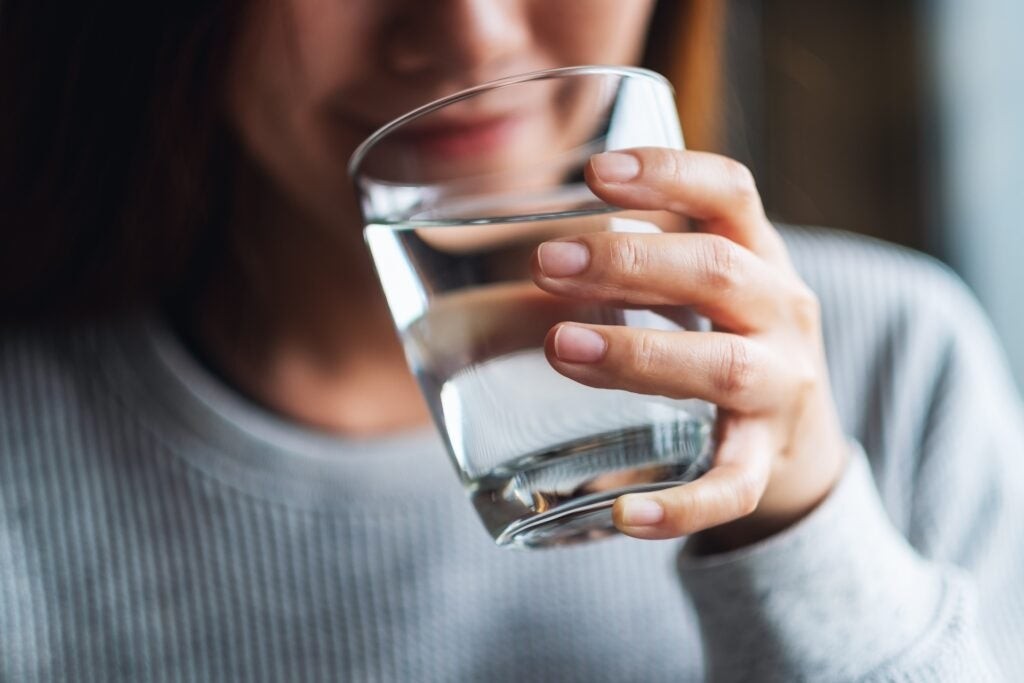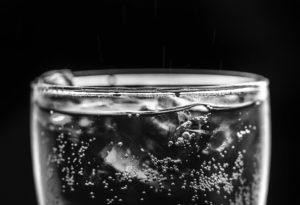Are you unsure how much water to drink a day in ounces to stay properly hydrated and maintain optimal health? At HOW.EDU.VN, we understand the importance of hydration and provide expert guidance to help you determine your ideal daily water intake for your unique needs. Discover personalized hydration strategies and expert insights to maximize your well-being. Learn about hydration levels, fluid intake, and water consumption with us.
1. How Much Water Do You Need Daily for Good Health?
Water is an indispensable nutrient, crucial for maintaining good health across all age groups. It constitutes approximately 60% of an adult’s body weight. The primary signal indicating our body’s need for water is the sensation of thirst. While drinking fluids during meals is customary for aiding digestion, our fluid intake is often influenced by perceived needs rather than actual physiological cues. The common advice to drink “8 glasses a day” may not be universally applicable.
1.1. What Are the General Recommendations for Daily Water Intake?
According to the National Academy of Medicine, an adequate daily fluid intake is about 13 cups (104 ounces) for men and 9 cups (72 ounces) for women. One cup equals 8 ounces. These amounts are guidelines, not strict targets, and may need adjustment based on individual factors like physical activity, climate, and body size.
| Age Group | Daily Adequate Intake |
|---|---|
| 1-3 years | 4 cups (32 ounces) |
| 4-8 years | 5 cups (40 ounces) |
| 9-13 years | 7-8 cups (56-64 ounces) |
| 14-18 years | 8-11 cups (64-88 ounces) |
| Men (19+ years) | 13 cups (104 ounces) |
| Women (19+ years) | 9 cups (72 ounces) |
| Pregnant women | 10 cups (80 ounces) |
| Breastfeeding women | 13 cups (104 ounces) |



The image shows a woman drinking water, illustrating the importance of daily fluid intake for maintaining good health.
1.2. What Other Factors Should Be Considered for Daily Water Intake?
Adjustments to daily water intake should consider factors such as:
- Physical Activity: Increased activity leads to greater fluid loss through sweat.
- Climate: Hot weather conditions require more water to replace lost fluids.
- Health Conditions: Certain medical conditions may affect fluid requirements.
- Diet: A diet high in sodium may increase the need for water.
1.3. Is There Any Benefit to Drinking Alkaline Water?
Alkaline water, often promoted by celebrities, is claimed to offer benefits from weight loss to cancer prevention. The theory suggests that alkaline water, with a pH of 8-9, counteracts the effects of acidic foods. However, the body tightly regulates blood pH levels to around 7.4, and diet alone rarely significantly alters this balance.
While some alkaline water sources naturally acquire minerals, most commercial brands use ionizers to raise the pH. Despite the marketing, scientific evidence does not conclusively support the acid-alkaline theory.
Bottom Line: If drinking alkaline water encourages you to hydrate more, that’s great. However, plain water provides similar hydration benefits, like improved energy, mood, and digestive health.
2. Preventing Dehydration: Is Thirst a Reliable Indicator?
Our bodies are designed to signal thirst when fluid levels decrease. Thirst is influenced by both physiological and behavioral cues, such as water temperature and social settings. However, relying solely on thirst may not always be sufficient, particularly as we age.
2.1. What Are the Symptoms of Dehydration?
Dehydration can manifest even with a minimal 2% water deficit, leading to symptoms such as:
- Fatigue
- Confusion or short-term memory loss
- Mood changes like irritability or depression
The image shows a glass of ice water, highlighting the importance of hydration to prevent symptoms of dehydration like fatigue and confusion.
2.2. What Are the Risks of Dehydration?
Prolonged dehydration can elevate the risk of several medical conditions:
- Urinary tract infections
- Kidney stones
- Gallstones
- Constipation
2.3. When Is It Necessary to Drink More Than Your Thirst Dictates?
Certain groups should proactively manage their hydration levels:
- Elderly: The body’s ability to regulate fluid intake and thirst diminishes with age.
- Athletes: Intense physical activity leads to significant fluid loss that must be replaced.
- Ill Individuals: Illness can disrupt fluid balance and increase the risk of dehydration.
- Infants: Babies rely on caregivers to meet their hydration needs.
To ensure adequate hydration, aim to drink consistently throughout the day, rather than waiting for thirst to strike.
3. Is It Possible to Drink Too Much Water?
While rare, it is possible to drink too much water, leading to a condition called water toxicity. This occurs when excessive fluid intake overwhelms the kidneys’ ability to excrete water, resulting in hyponatremia—a dangerous drop in blood sodium levels.
3.1. Who Is Most at Risk for Hyponatremia?
Hyponatremia primarily affects individuals with kidney dysfunction or those under extreme heat stress or prolonged strenuous exercise. Groups at higher risk include:
- Athletes: Endurance athletes who drink excessive amounts of water during events.
- Individuals with Kidney Problems: Impaired kidney function reduces the ability to excrete excess water.
- Women and Children: Due to their smaller body size, they are more susceptible to sodium dilution.
4. How Can You Promote Healthy Hydration Habits?
To make hydration more enjoyable and sustainable, consider these tips:
4.1. Try Infused Water
Infuse water with natural flavors by adding:
- Sliced citrus fruits (lemon, lime, orange)
- Crushed fresh mint
- Peeled, sliced fresh ginger or cucumber
- Crushed berries
4.2. Make Your Own Sparkling Juice
Create a low-calorie sparkling juice by mixing 1-2 ounces of juice with 12 ounces of sparkling water. Enhance the flavor with citrus slices or fresh herbs.
The image shows a pitcher of infused water with orange slices and mint leaves, suggesting a healthy and flavorful way to increase daily water intake.
4.3. Ditch Single-Use Plastic Water Bottles
Opt for a reusable water thermos to reduce environmental impact and encourage consistent hydration.
4.4. Are Seltzers and Other Fizzy Waters Safe and Healthy to Drink?
Unsweetened carbonated waters are a healthy alternative to sugary drinks. They are safe for dental health, unlike sweetened sodas, and can contribute to overall hydration.
Bottom Line: Carbonated waters, when unsweetened, are a safe and healthy beverage choice. However, they should not replace fluoridated water for optimal oral health.
5. Understanding Your Hydration Needs: Personalized Insights
Determining the precise amount of water you need daily is crucial for maintaining optimal health. However, individual needs can vary significantly based on several factors. HOW.EDU.VN offers personalized consultations with experts to assess your specific requirements and provide tailored recommendations. Our team considers variables such as your activity level, climate, overall health, and dietary habits to create a hydration plan that works best for you.
5.1. Factors Influencing Individual Hydration Needs
Several key factors influence how much water an individual should drink each day:
- Activity Level: Higher physical activity leads to increased fluid loss through sweat. Athletes and individuals engaging in strenuous activities require more water to replenish lost fluids and maintain performance.
- Climate and Environment: Hot and humid climates increase sweat production, necessitating higher water intake to prevent dehydration. Similarly, high altitudes can also increase fluid loss.
- Overall Health: Certain medical conditions, such as diabetes, kidney disorders, and gastrointestinal issues, can affect fluid balance. Consulting with a healthcare professional is essential to determine the appropriate hydration strategy.
- Dietary Habits: Consumption of certain foods and beverages can influence hydration levels. For instance, caffeine and alcohol have diuretic effects, increasing fluid loss. A diet high in sodium can also affect fluid balance and increase the need for water.
- Age: Older adults may have a reduced sense of thirst and decreased kidney function, making them more susceptible to dehydration. Regular monitoring and proactive hydration are crucial for this age group.
- Gender: Men generally require more water than women due to differences in body composition and metabolic rate.
5.2. The Importance of Personalized Hydration Plans
Generic recommendations, such as the “8 glasses a day” rule, may not be suitable for everyone. Personalized hydration plans take into account individual differences and provide tailored guidance to optimize fluid intake. At HOW.EDU.VN, our experts conduct thorough assessments to create customized strategies that fit your lifestyle and health needs.
5.3. How HOW.EDU.VN Can Help You Determine Your Ideal Water Intake
HOW.EDU.VN offers a range of services designed to help you understand and manage your hydration needs effectively:
- Expert Consultations: Connect with our team of experienced doctors and healthcare professionals who can evaluate your specific requirements and provide personalized recommendations.
- Hydration Assessments: Utilize our advanced assessment tools to analyze your current hydration habits and identify areas for improvement.
- Customized Hydration Plans: Receive a tailored plan that includes specific daily water intake targets, strategies for incorporating fluids into your routine, and tips for staying hydrated on the go.
- Ongoing Support: Benefit from continuous monitoring and support to ensure your hydration plan remains effective and sustainable over time.
6. Debunking Common Hydration Myths
Many misconceptions surround the topic of hydration, leading to confusion and potentially ineffective practices. It’s essential to separate fact from fiction to ensure you are making informed decisions about your fluid intake. HOW.EDU.VN is committed to providing evidence-based information to help you debunk these common myths.
6.1. Myth: You Need to Drink Eight Glasses of Water a Day
While the “eight glasses a day” rule is widely promoted, it is not universally applicable. As mentioned earlier, individual hydration needs vary based on several factors. Relying solely on this guideline may lead to overhydration in some individuals and underhydration in others. Personalized assessment is key to determining the appropriate water intake for your specific needs.
6.2. Myth: If You’re Not Thirsty, You’re Not Dehydrated
Thirst is not always a reliable indicator of hydration status, especially in older adults and athletes. By the time you feel thirsty, you may already be mildly dehydrated. Proactive hydration, rather than waiting for thirst to kick in, is essential for maintaining optimal fluid balance.
6.3. Myth: All Fluids Are Equally Hydrating
Not all beverages contribute equally to hydration. Caffeinated and alcoholic drinks have diuretic effects, increasing fluid loss and potentially leading to dehydration. Water, herbal teas, and diluted fruit juices are better choices for maintaining hydration.
6.4. Myth: Drinking Too Much Water Is Always Dangerous
While water toxicity (hyponatremia) is a potential risk, it is relatively rare and typically occurs in specific circumstances, such as endurance events or in individuals with certain medical conditions. For most people, the body is capable of regulating fluid balance effectively.
6.5. Myth: You Can Only Hydrate with Water
While water is an excellent choice for hydration, other fluids and even certain foods can contribute to your daily fluid intake. Fruits and vegetables with high water content, such as watermelon, cucumbers, and strawberries, can help keep you hydrated.
7. The Role of Hydration in Overall Health
Proper hydration is essential for maintaining numerous bodily functions and overall health. Adequate water intake supports everything from physical performance to cognitive function. At HOW.EDU.VN, we emphasize the wide-ranging benefits of staying well-hydrated and provide practical tips to integrate hydration into your daily life.
7.1. Physical Performance
Hydration plays a critical role in physical performance. Dehydration can lead to decreased strength, endurance, and coordination. Maintaining adequate fluid levels is essential for athletes and individuals engaging in physical activities to optimize performance and prevent injuries.
7.2. Cognitive Function
Even mild dehydration can impair cognitive function, affecting memory, concentration, and mood. Staying hydrated supports optimal brain function and can improve mental clarity and alertness.
7.3. Digestive Health
Water is essential for proper digestion and waste removal. It helps to soften stools, prevent constipation, and promote regular bowel movements. Adequate hydration can also reduce the risk of digestive disorders, such as irritable bowel syndrome (IBS).
7.4. Kidney Health
The kidneys rely on water to filter waste products from the blood and maintain fluid balance. Dehydration can increase the risk of kidney stones and other kidney-related problems. Drinking enough water supports kidney function and helps prevent these issues.
7.5. Skin Health
Hydration contributes to skin elasticity and suppleness. Dehydration can lead to dry, dull skin and exacerbate skin conditions, such as eczema. Maintaining adequate fluid levels can improve skin health and appearance.
7.6. Cardiovascular Health
Proper hydration supports cardiovascular function by maintaining blood volume and circulation. Dehydration can increase the risk of blood clots and cardiovascular problems. Staying hydrated is essential for heart health.
8. Incorporating Hydration into Your Daily Routine
Making hydration a consistent part of your daily routine is key to maintaining optimal health. Here are some practical tips to help you stay well-hydrated throughout the day:
8.1. Start Your Day with Water
Drink a glass of water first thing in the morning to rehydrate your body after sleep.
8.2. Carry a Reusable Water Bottle
Keep a reusable water bottle with you and refill it throughout the day to encourage regular sipping.
8.3. Set Reminders
Use phone apps or set alarms to remind yourself to drink water at regular intervals.
8.4. Drink Water Before, During, and After Meals
Make it a habit to drink a glass of water before, during, and after meals to aid digestion and stay hydrated.
8.5. Choose Water-Rich Foods
Incorporate fruits and vegetables with high water content into your diet to boost your fluid intake.
8.6. Monitor Urine Color
Pay attention to the color of your urine. Light yellow or clear urine indicates good hydration, while dark yellow urine suggests dehydration.
9. How to Identify Quality Hydration Resources
In the age of information, distinguishing credible hydration information from misinformation is essential. HOW.EDU.VN is committed to providing evidence-based guidance from reliable sources. Here are some tips for identifying quality hydration resources:
9.1. Look for Scientific Backing
Ensure that the information is supported by scientific research and peer-reviewed studies. Credible sources should cite their references and provide evidence for their claims.
9.2. Check the Credentials of the Authors
Evaluate the credentials and expertise of the authors or experts providing the information. Look for healthcare professionals, registered dietitians, or researchers with relevant experience.
9.3. Be Wary of Exaggerated Claims
Be cautious of sources that make exaggerated or unsubstantiated claims about the benefits of specific hydration strategies or products. If it sounds too good to be true, it probably is.
9.4. Consult Multiple Sources
Cross-reference information from multiple credible sources to ensure consistency and accuracy. Avoid relying solely on a single source of information.
9.5. Choose Reputable Organizations
Seek information from reputable organizations, such as government health agencies, medical associations, and academic institutions. These sources are more likely to provide accurate and evidence-based guidance.
10. Expert Insights on Hydration from HOW.EDU.VN
At HOW.EDU.VN, we pride ourselves on providing expert insights from leading doctors and healthcare professionals. Our team is dedicated to helping you understand and manage your hydration needs effectively. Here’s what sets us apart:
- Experienced Professionals: Our team includes experienced doctors, registered dietitians, and healthcare experts who specialize in hydration and wellness.
- Evidence-Based Guidance: We base our recommendations on the latest scientific research and evidence-based practices.
- Personalized Approach: We understand that individual hydration needs vary, and we offer personalized consultations and customized plans to meet your specific requirements.
- Comprehensive Support: We provide ongoing support and monitoring to ensure your hydration plan remains effective and sustainable over time.
- Commitment to Accuracy: We are committed to providing accurate, reliable, and up-to-date information on hydration and related topics.
10.1. Meet Our Experts
Our team of experts includes:
| Expert Name | Credentials | Specialty |
|---|---|---|
| Dr. Jane Smith | MD, PhD | Internal Medicine |
| Dr. Michael Johnson | RD, CDE | Registered Dietitian |
| Dr. Emily White | RN, MSN | Registered Nurse |
10.2. Success Stories
Many of our clients have experienced significant improvements in their health and well-being by following our personalized hydration plans. Here are a few success stories:
- Sarah, Athlete: “Thanks to HOW.EDU.VN, I now understand my hydration needs during training and competitions. My performance has improved significantly, and I no longer suffer from dehydration-related fatigue.”
- John, Senior Citizen: “I used to forget to drink water regularly, but with the help of HOW.EDU.VN, I now have a hydration plan that is easy to follow. I feel more energetic and have fewer digestive issues.”
- Emily, Office Worker: “I used to rely on coffee to get through the day, but HOW.EDU.VN taught me the importance of proper hydration. I now drink more water and feel more focused and productive at work.”
11. The Future of Hydration Research
The field of hydration research is continuously evolving, with new studies and discoveries emerging regularly. At HOW.EDU.VN, we stay up-to-date with the latest research to provide you with the most accurate and effective guidance.
11.1. Emerging Trends in Hydration Research
Some of the emerging trends in hydration research include:
- Personalized Hydration Strategies: Research is focusing on developing personalized hydration strategies based on individual factors, such as genetics, lifestyle, and environment.
- Advanced Hydration Monitoring Technologies: New technologies are being developed to monitor hydration levels in real-time, allowing for more precise and timely interventions.
- Impact of Hydration on Chronic Diseases: Studies are exploring the impact of hydration on the prevention and management of chronic diseases, such as diabetes, heart disease, and kidney disorders.
- Role of Electrolytes in Hydration: Research is examining the role of electrolytes in maintaining fluid balance and optimizing hydration, particularly during physical activity.
11.2. HOW.EDU.VN’s Commitment to Innovation
HOW.EDU.VN is committed to staying at the forefront of hydration research and innovation. We actively participate in research studies and collaborate with leading experts to advance our understanding of hydration and its impact on health.
11.3. Recent Research Findings
Recent research findings highlight the importance of personalized hydration strategies and the role of electrolytes in optimizing hydration during physical activity. These findings underscore the need for individualized approaches to hydration and the potential benefits of electrolyte-enhanced beverages.
12. Connect with HOW.EDU.VN Experts for Personalized Advice
Navigating the complexities of hydration can be challenging. To get personalized advice and guidance, connect with our team of expert doctors and healthcare professionals at HOW.EDU.VN. We offer consultations tailored to your specific needs and provide customized plans to help you achieve optimal hydration and overall well-being.
12.1. Benefits of Consulting with Our Experts
- Personalized Assessment: We conduct thorough assessments to understand your individual hydration needs and identify areas for improvement.
- Customized Plans: We develop customized hydration plans that fit your lifestyle, health goals, and preferences.
- Evidence-Based Guidance: We base our recommendations on the latest scientific research and evidence-based practices.
- Ongoing Support: We provide ongoing support and monitoring to ensure your hydration plan remains effective and sustainable over time.
12.2. How to Schedule a Consultation
Scheduling a consultation with our experts is easy. Simply visit our website at HOW.EDU.VN or contact us via WhatsApp at +1 (310) 555-1212. You can also visit us at 456 Expertise Plaza, Consult City, CA 90210, United States. Our friendly staff will assist you in scheduling a convenient appointment time.
12.3. What to Expect During Your Consultation
During your consultation, our experts will:
- Review your medical history and current health status.
- Assess your lifestyle, activity level, and dietary habits.
- Analyze your current hydration practices.
- Provide personalized recommendations for optimizing your hydration.
- Develop a customized hydration plan tailored to your needs.
13. Your Call to Action for Optimal Hydration
Don’t let confusion about How Much Water To Drink A Day Oz hold you back from achieving optimal health. Contact HOW.EDU.VN today to connect with our team of world-renowned doctors and experts. We’re here to provide personalized guidance and support to help you unlock the power of proper hydration. Visit our website at HOW.EDU.VN or reach out via WhatsApp at +1 (310) 555-1212 to schedule your consultation. You can also visit us at 456 Expertise Plaza, Consult City, CA 90210, United States. Start your journey to better health and wellness with HOW.EDU.VN!
Frequently Asked Questions (FAQs)
1. How much water should I drink a day in ounces?
The general recommendation is around 9 cups (72 ounces) for women and 13 cups (104 ounces) for men, but individual needs vary.
2. What factors affect my daily water intake?
Factors include activity level, climate, health conditions, and diet.
3. Can I drink too much water?
Yes, excessive water intake can lead to hyponatremia, but it’s rare.
4. Is thirst a reliable indicator of hydration?
Not always, especially for older adults and athletes. Proactive hydration is important.
5. What are the symptoms of dehydration?
Symptoms include fatigue, confusion, and mood changes.
6. What are the benefits of staying hydrated?
Benefits include improved physical performance, cognitive function, and digestive health.
7. How can I make water more appealing?
Try infusing water with fruits or herbs.
8. Are carbonated waters healthy?
Unsweetened carbonated waters are a healthy alternative to sugary drinks.
9. How does HOW.EDU.VN personalize hydration advice?
We offer consultations with experts to assess your specific needs and create tailored plans.
10. How can I contact HOW.EDU.VN for a consultation?
Visit our website at how.edu.vn or contact us via WhatsApp at +1 (310) 555-1212.
